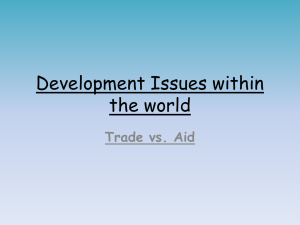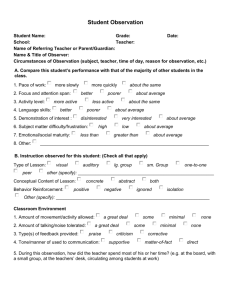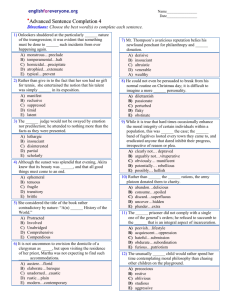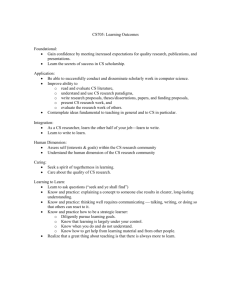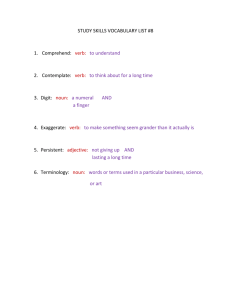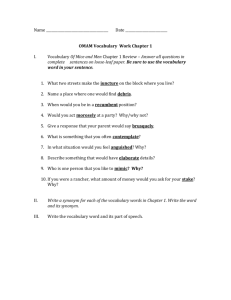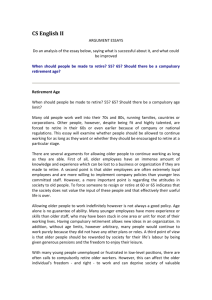Name
advertisement
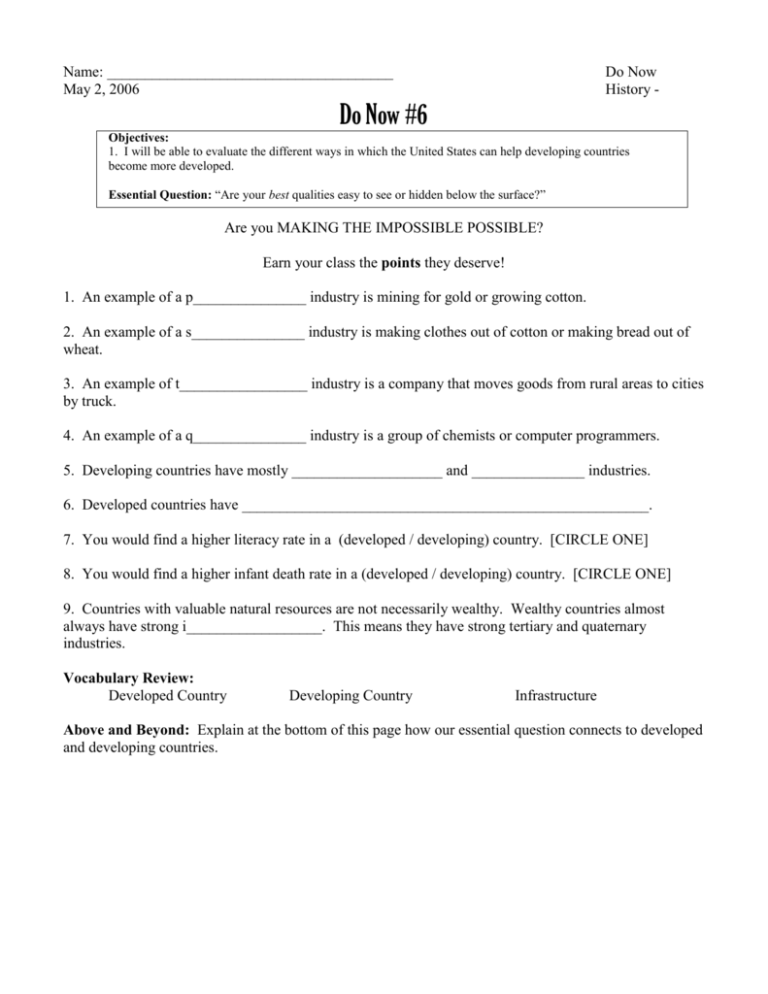
Name: ______________________________________ May 2, 2006 Do Now History - Do Now #6 Objectives: 1. I will be able to evaluate the different ways in which the United States can help developing countries become more developed. Essential Question: “Are your best qualities easy to see or hidden below the surface?” Are you MAKING THE IMPOSSIBLE POSSIBLE? Earn your class the points they deserve! 1. An example of a p_______________ industry is mining for gold or growing cotton. 2. An example of a s_______________ industry is making clothes out of cotton or making bread out of wheat. 3. An example of t_________________ industry is a company that moves goods from rural areas to cities by truck. 4. An example of a q_______________ industry is a group of chemists or computer programmers. 5. Developing countries have mostly ____________________ and _______________ industries. 6. Developed countries have ______________________________________________________. 7. You would find a higher literacy rate in a (developed / developing) country. [CIRCLE ONE] 8. You would find a higher infant death rate in a (developed / developing) country. [CIRCLE ONE] 9. Countries with valuable natural resources are not necessarily wealthy. Wealthy countries almost always have strong i__________________. This means they have strong tertiary and quaternary industries. Vocabulary Review: Developed Country Developing Country Infrastructure Above and Beyond: Explain at the bottom of this page how our essential question connects to developed and developing countries. Name: ______________________________________ May 2, 2006 Classwork #6: Classwork History - What the U.S. can do to help developing countries Aid for the Developing World: Remember what we said yesterday about why we should care about developing countries. First, we might feel sympathetic for people living in poverty around the globe. We might feel sorry for people who live in areas where infant death rates are high and where literacy rates are low. We might think about helping because we feel sorry for them. Even if we don’t feel sympathetic, however, we should help the developing world because people living in poor countries can become angry. They can direct that anger toward the wealthy countries of the world. If the U.S. wants to have friends around the globe, we absolutely must help poorer countries get on their feet. But how do we do this? Option #1: Direct Aid - Goods The first option countries like the United States have is to give goods like clothing and food to poor countries. This option has many advantages. It quickly provides relief to people who suffer from starvation and from harsh weather. It is also relatively easy for the U.S. to drop off goods in a given country. However, there are serious disadvantages as well. By giving food to a country, people in that country might not learn to grow food for themselves. In other words, they may be ok for a few weeks, but what happens after that? Furthermore, remember that countries need infrastructure to become developed nations. Food and clothing may help relieve suffering, but it does not create the tertiary and quaternary industries that these countries need in the long run. Option #2: Direct Aid - Money The second option is to give money to developing countries. Again, there are serious advantages. The governments have the flexibility to use this money where they see the biggest need (clothing, food, shelter, roads, etc…). Governments can use money to build infrastructure. They can invest in railroads, in airports, in bus companies, in schools, in computers, and in factories. Here too, however, there are serious problems. Developing countries are often unsafe places, and government workers are not always honest. Often, money mysteriously “disappears.” Government officials take some. Some is stolen. Some is simply lost. This loss of money is called corruption. Option #3: Loans Some people in the US support giving loans to developing nations. Here, poorer countries get the money they need to develop infrastructure (roads, police stations, schools, etc…), but they eventually need to pay this money back to the United States. The major problem here is that most of the new money that the poorer country makes goes directly back to repaying the loan. Instead of using newly earned money for further improvements to the country, governments wind up giving most of their income back to the United States. The poor countries remain poor. Option #4: Paying U.S. Businesses to Open Factories in Developing Countries The final option that we will examine in this class is for the US government to pay US businesses to open factories in developing countries. Here, the US businesses help create some of the infrastructure in developing countries. The poorer countries now have thousands of new jobs available for their people. The problem is that the US companies then pay their foreign workers very low wages. The foreigners often work in horrible conditions that are illegal in the United States. Above and Beyond: Create illustrations for this reading in the margins. Part II: Complete the missing parts of today’s skeleton in the space below. Part III: Follow each of the steps below. 1. Below each option, create illustrations of its advantages and disadvantages. 2. Create a kinesthetic hand motion for each of the options. 3. Match each option on the left with the corresponding description on the right by drawing a line. 1. Direct Aid - Goods The new jobs in the developing country pay very little. Working conditions are terrible. 2. Direct Aid - Money Citizens of a developing country get quick relief for hunger and weather but no help in building infrastructure. 3. Loans Most of this type of aid is lost to corruption. 4. Paying US companies to open factories in developing countries After building infrastructure, most of the government’s money goes back to the USA. Name: ______________________________________ May 2, 2006 Homework History - Homework #6: Historians Can Hack EOG’s to Bits Directions: Write a short paragraph in which you answer the following questions. 1. Which option from today’s reading is the best for helping developing countries? 2. Which option from today’s reading is the worst for helping developing countries? Make sure your paragraph uses THREE English vocab words. CIRCLE EACH ONE.. They are listed on the back of this page if you need help. _____________________________________________________________________________________ _____________________________________________________________________________________ _____________________________________________________________________________________ _____________________________________________________________________________________ _____________________________________________________________________________________ _____________________________________________________________________________________ _____________________________________________________________________________________ _____________________________________________________________________________________ Name: ______________________________________ May 2, 2006 Homework History - Homework #6: Historians Can Hack EOG’s to Bits Directions: Write a short paragraph in which you answer the following questions. 1. Which option from today’s reading is the best for helping developing countries? 2. Which option from today’s reading is the worst for helping developing countries? Make sure your paragraph uses THREE English vocab words. CIRCLE EACH ONE.. They are listed on the back of this page if you need help. _____________________________________________________________________________________ _____________________________________________________________________________________ _____________________________________________________________________________________ _____________________________________________________________________________________ _____________________________________________________________________________________ _____________________________________________________________________________________ _____________________________________________________________________________________ _____________________________________________________________________________________ _____________________________________________________________________________________ 1. revolution 2. adroitly 3. vanquish 4. exceptional 5. eloquence 6. compromise 7. elusive 8. subtle 9. egregious 10. narrative11. vernacular 12. speculate 13. chutzpah 14. advocate 15. malicious 16. avert 17. plight 18. benign 19. brew 20. sustain 21. admonish 22. tidbit 23. amiable 24. reverberate 25. monotonous 26. indignant 27. emit 28. dismal 29. listless 30. feign 31. subdued 32. embers 33.interminable 34. shrill 35.affirm 36.sullen 37. schlep 38. gaze 39. resent 40. bitter 41. rile 42. jovial 43. placid 44.reproach 45. testily 46. grudge 47. raucous 48. throngs 49. haggard 50. 51. 52. formidable 53. inherit 54. limb 55. lopsided 56. jut 57. kibbitz 58. evoke 59. revoke 60. scarcely 61. threshold 62. content 63. bazaar 64. will 65. maven 66. shmutz 67. implly 68. voracious 69. intrepid 70. obliterate 71. feeble 72. ornery 73. contemplate 74. excruciating 75. nuisance 76. explicit 77. repercussions 78. contemplate 79. exemplify 80. expound 81. collaborate 82. enumerate 83. dilapidated 84. obdurate 85. contend 86. concede 87. petulant 88. obdurate 89. antiquated 90. muffled 91. haughty 92. writhing 93. melancholy 94. precedent 95. litany 96. prominent 97. shrewd 98. copius 99. valiant 101. congenial 102.dispute 103. relinquish 104. eminent 105. onerous 106. simultaneous 107. ubiquitous 108. chastise 109. 110. convoluted 111. forge 112. kvetch 113. irate 114. deftly 115. ample 116. desolation 117. plaintive 118. oblige 119. assure 120. thrive 121. agitated 122. strive 123. wary 124. curt 125. retort 126. frantic 127 . envy 128. recuperate 129. forfeit 130. righteous 131.browse 132. verbalize 133.traumatic 134. bout 135. punitive 136 .tuft 137. assimilate 138. detrimental 139. reprehensible _____________________________________________________________________________________ 1. revolution 2. adroitly 3. vanquish 4. exceptional 5. eloquence 6. compromise 7. elusive 8. subtle 9. egregious 10. narrative11. vernacular 12. speculate 13. chutzpah 14. advocate 15. malicious 16. avert 17. plight 18. benign 19. brew 20. sustain 21. admonish 22. tidbit 23. amiable 24. reverberate 25. monotonous 26. indignant 27. emit 28. dismal 29. listless 30. feign 31. subdued 32. embers 33.interminable 34. shrill 35.affirm 36.sullen 37. schlep 38. gaze 39. resent 40. bitter 41. rile 42. jovial 43. placid 44.reproach 45. testily 46. grudge 47. raucous 48. throngs 49. haggard 50. 51. 52. formidable 53. inherit 54. limb 55. lopsided 56. jut 57. kibbitz 58. evoke 59. revoke 60. scarcely 61. threshold 62. content 63. bazaar 64. will 65. maven 66. shmutz 67. implly 68. voracious 69. intrepid 70. obliterate 71. feeble 72. ornery 73. contemplate 74. excruciating 75. nuisance 76. explicit 77. repercussions 78. contemplate 79. exemplify 80. expound 81. collaborate 82. enumerate 83. dilapidated 84. obdurate 85. contend 86. concede 87. petulant 88. obdurate 89. antiquated 90. muffled 91. haughty 92. writhing 93. melancholy 94. precedent 95. litany 96. prominent 97. shrewd 98. copius 99. valiant 101. congenial 102.dispute 103. relinquish 104. eminent 105. onerous 106. simultaneous 107. ubiquitous 108. chastise 109. 110. convoluted 111. forge 112. kvetch 113. irate 114. deftly 115. ample 116. desolation 117. plaintive 118. oblige 119. assure 120. thrive 121. agitated 122. strive 123. wary 124. curt 125. retort 126. frantic 127 . envy 128. recuperate 129. forfeit 130. righteous 131.browse 132. verbalize 133.traumatic 134. bout 135. punitive 136 .tuft 137. assimilate 138. detrimental 139. reprehensible
